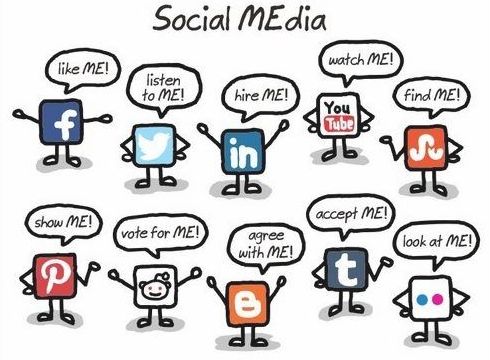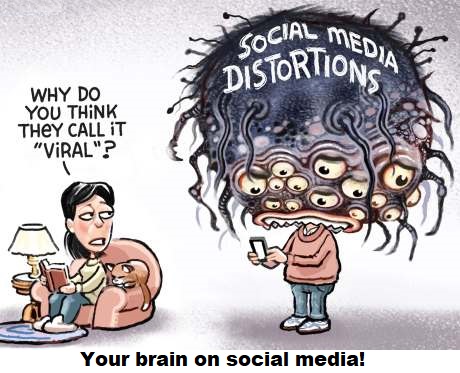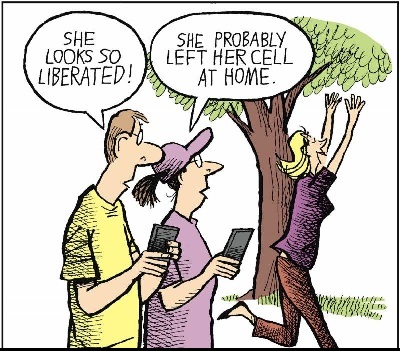 November 2020
November 2020
Social media, not unlike narcotics, causes a type of addiction.
ad·dic·tion
/əˈdikSH(ə)n/
noun
“A compulsive, chronic, physiological or psychological need for a habit-forming substance, behavior, or activity having harmful physical, psychological, or social effects and typically causing well-defined symptoms (such as anxiety, irritability, tremors, or nausea) upon withdrawal or abstinence : the state of being addicted.” (Source – Merriam Webster.)

It didn’t start out this way.
At first social media was a good thing. It helped families reunite with lost members. It helped find organ donors, missing children and long-lost friends. A lot of good things came from social media but everybody has bills to pay. So, we had to find some way to monetize it. That is when we started down the rabbit hole.
Do you know someone who is fixated on Facebook or tied to Twitter for hours at a time? Are they ignoring friends and family in the immediate vicinity in favor of their social media contacts? Are they lost in the digital realm and completely oblivious to the world around them? Are they even at risk of personal injury walking into lampposts while gaming or even causing accidents because they are texting and driving at the same time?
There is a reason why otherwise normal, intelligent men and women behave this way. They are hooked! As in addicted, like a junkie they have a technological monkey on their back. People, particularly teens and pre-teens, often spend hours every day with only their phones and devices. They become withdrawn, isolated and no longer join friends and schoolmates in social activities.
Young girls want to get plastic surgery so they look more like the filtered pictures of themselves. Self-worth is determined by the number of “likes” that you get. In extreme cases young people have committed suicide because of what some Internet trolls have said about them. The line between the digital world and reality becomes blurred.
Social media use can lead to addiction.
This is not by accident. Companies like Instagram, You Tube, Facebook, Twitter, TikTok, Pinterest, Snapchat and others are sales organizations and the product they are selling is you.
The algorithms used in various social media apps are specifically designed to keep you starring at the screen for as long as possible. They make money, and lots of it, by showing you ads for their customers. So, the longer they can keep your attention the more money they can make.
Seeing things that you like or are interested in trigger the pleasure centers in your brain. Releasing chemicals that cause a feeling of euphoria like a dose of an addictive drug. The object is to get you to remain focused on the display so that they can show you yet another ad.
These algorithms and AI know you better than you think. Every click, like, search you make is logged and tracked. Based on previous clicks, likes, searches and location they can predict what will keep your interest and show it to you. And they are very good at estimating what will keep your interest. While the human brain has evolved a little in the last ten thousand years. AI has evolved millions of times in the last ten years. It really isn’t even a fair fight.
If you search Facebook for something like, “flat earth” Facebook will show you posts showing that the earth is flat. The more you click on those links the more posts about flat earth you’ll see. Until you think that everyone believes the earth is flat. Eventually you ever start to believe it yourself. How could these round earthers be so dumb? Don’t they see all this evidence that the earth is flat?

No, they don’t see any of that.
If you do a Google search for something, say, “election results”. You will get a different result than your friends in another state. Or you relatives in a different country. Google will try to match you with searches by other people in your geographical area who have the same viewpoint as you. Eventually you will have built yourself into a social media bubble containing what the AI algorithms think you want to see. Reality has no bearing here just a constant effort to keep you scrolling through post after post while they show you ads.
“Any sufficiently advanced technology is indistinguishable from magic.” Arthur C. Clarke. A good magician can focus your attention over here while the real sleight-of-hand is taking place over there. You don’t notice the sleight-of-hand and suddenly a rabbit pops out of the hat. It’s magic. AI is a very good magician. The social media engineers are always testing and developing new magic tricks You think you are learning, advancing and growing as a person. In fact, you are just a lab rat spinning the wheel so that others can make money.
Consider what happened in Myanmar, (formerly Burma).
The normally good, hardworking people of Myanmar committed unthinkable crimes against their Rohingya Muslim neighbors based on what they saw on Facebook. Facebook isn’t inherently evil but some very evil people in the Myanmar government used the tools in Facebook to motivate the people to commit genocide. Facebook was able to illicit real-world action from people who would never have even thought of causing such harm to another person. The AI had dug so deep into their brain that they didn’t even realize they were being manipulated.
There are plenty of people in the world, both good and bad, who would pay huge sums of money to get just a small change in your real-world actions. A change in your habits, what you buy, where you go, what you believe, how you vote. These behavioral changes could shift the balance of power in so many ways. And you won’t even realize that you are being used to accomplish someone else’s goals.

What can you do?
Dragging the principals of these companies before congress for another dog and pony show won’t help. They are not in charge of these things anyway. Only a handful of people at these companies actually know what the algorithms are doing, and then only in a general sense. Once you create the algorithm and set it in motion it starts working and the AI develops so fast that the human creators just can’t keep up. AI is running the show now.
Question everything! When I was a kid, we were taught “only believe half of what we see and none of what we hear”. These days I would say more like five percent of what you see and none of what you hear. Studies have shown that on Twitter fake news propagates though the system six times faster than real news. (Sorry, but fake is exciting while real is boring.) Confirmation using other sources of information, from other states, other countries, other religions even other political parties can be helpful. Don’t trust any one source for information. Become the modern-day equivalent of Doubting Thomas and actually touch the wound to see if it is real.
Turn off all notifications. No beeps, buzzers or vibrations to entice you to check your device. Check for messages on your schedule, not when the app says so.
Unload any apps that you are not using right now. If you need it at some point in the future install it then. Reduce the number of interruptions to your day that don’t actually benefit you.
Set limits and quotas on usage. Like no devices at dinner or after a certain time. (I am particularly bad about this one. Here it is after midnight and I am still at the keyboard. Just trying to get a few more things done.)
Restrict social media usage. Many of the engineers, developers and founders of Silicon Valley do not permit their children to use social media. That should tell you something about the effect of social media on young minds. We don’t allow certain kinds of ads on children’s TV shows or in the classroom. But on the Internet, it’s wide open and people, particularly children, are exposed to some intense manipulation that they may not be equipped to handle.
Unplug for a while, maybe an hour or so. Make some time when you are not interrupted by anything and just relax. Some people call it meditating but you don’t have to become a Buddhist monk. Just take some time to think about something relaxing and pleasant. Listen to your favorite music or read a book. Even if just a few minutes can help you focus and get back to normal.
And remember — always back it up!